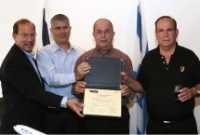Israel is a candidate for OECD membership, though the process will take a number of years, and the treasury views membership in the development center as another step on this path
Israel, Egypt and Vietnam officially joined last week the OECD Development Center. The OECD Development center was established in 1962 as a semi-autonomous body whose members include both OECD and non-OECD member states with the aim of providing a bridge between members of the OECD group of developed countries and developing nations. The goal is to aid decision makers in developing countries in making decisions to encourage economic growth and improving their citizens' standard of living.
Egypt was appointed to the OECD Development Center as a leading Arab and African country, and Vietnam as an emerging market.
Israel is a candidate for OECD membership, though the process will take a number of years, and the treasury views membership in the development center as another step on this path. In addition, Israel is considered a nation with much to contribute to developing countries.
Oded Brook, senior deputy director and General Head of International Affairs at the Finance Ministry , said that the acceptance to the OECD Development Center is an important step towards full OECD membership.
Deputy Director of Israel’s Ministry of Foreign Affairs and Head of its Centre for International Co-operation-MASHAV, Haim Divon, remarked that his country’s joining the OECD’s Development Centre coincided with the 50th anniversary of his Centre. It was a “significant moment for Israel”, he said, and he hoped that Israel would “contribute as much to the Centre as it will get out of it.” The Development Centre thus sees its membership rise to 32 nations, with representatives of every continent except Australasia. This coincides with the restructuring of the Centre’s programmes better to reflect the geographical spread of its influence and activities.
In the 2009/2010 work programme, the Centre’s staff and projects will be linked to Africa and the Middle East, Latin America and Asia. The new members will, thus, find themselves well placed to participate in the discussions and analyses stemming from the programme. Moreover, in line with the Centre’s traditional mode of operation, they will be invited to contribute their ideas and eventually temporary staff in the course of the two-year programme.
Israel officially joined OECD Development Center
Israel is a candidate for OECD membership, though the process will take a number of years, and the treasury views membership in the development center as another step on this path
31.03.08 / 00:00
•
More articles that may interest you

Swiss WorldCargo to increase Tel Aviv capacity

Delta Air Lines began new nonstop service between New York-JFK and Tel Aviv

El Al Buys 4 Boeing 777s, investing USD$540M

CBS: Israel's Economy grew by 5.3% in 2007

Eilat Port privatization gets Transport Minister's support

Customs' workers strike is over
More news from Industry & Trade Section
>Customs and VAT employees launch work stoppage/17.03.08
>Exports of fresh agricultural produce in 2007 - $1.34 billion, up 32%/17.03.08
>Lynn visited Norway in an effort to better economic relations/17.03.08
>Commissioner pidla: Israel does little to widen co-operation with the EU/17.03.08
>Turkey returned in 2007 to the list of Israel's 10 largest export markets/10.03.08
>Hollandia factory abandoning Sderot/10.03.08
>Labor dispute at the Environment Ministry halts cargo clearance at Israeli ports/10.03.08
>CBS: durables imports in January-February 2008 up/10.03.08
>MAI revised economic growth forecast/25.02.08
>Tourists visiting Israel in January, up 57%/25.02.08
